

Gov't considering special law to allow Emperor Akihito to abdicate - The Mainichi. The government is considering a special law that would allow Emperor Akihito specifically to abdicate rather than revising the Imperial House Law, sources close to the administration said.
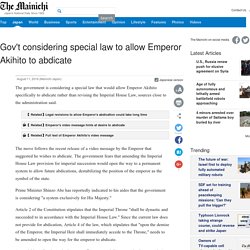
The move follows the recent release of a video message by the Emperor that suggested he wishes to abdicate. The government fears that amending the Imperial House Law provision for imperial succession would open the way to a permanent system to allow future abdications, destabilizing the position of the emperor as the symbol of the state. Prime Minister Shinzo Abe has reportedly indicated to his aides that the government is considering "a system exclusively for His Majesty. " Article 2 of the Constitution stipulates that the Imperial Throne "shall be dynastic and succeeded to in accordance with the Imperial House Law. " A special law allowing only the current Emperor to abdicate can also be enacted. Will the Japanese Akihito be allowed to abdicate? Toru Yamanaka/Getty Images.
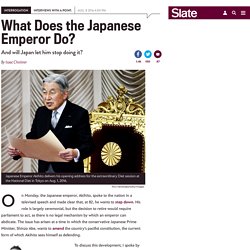
The real reason Japan’s emperor wants to abdicate. During his reign, Japanese Emperor Akihito, now 82, has done unprecedented things.
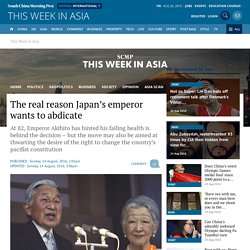
He has addressed his subjects by means of a television twice. He has married a “commoner”, Michiko. He has travelled abroad extensively. And he has publicly expressed “feeling a certain kinship” with Korea, by acknowledging blood ties that go back fifteen centuries with the former royal house of the nearby peninsula. Nobody occupying the Chrysanthemum Throne had ever been quite so humble and relatable. Read more from This Week in Asia.
Japan’s Emperor Akihito: Why it Matters if The Leader of the World’s Oldest Hereditary Monarchy Abdicates. At age 82, and in declining health, the emperor of Japan, Akihito, indicated in a televised address on August 9 that he is contemplating abdication from the world’s oldest hereditary monarchy.
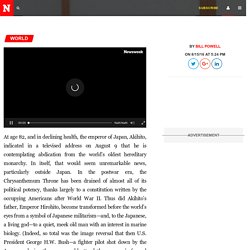
In itself, that would seem unremarkable news, particularly outside Japan. In the postwar era, the Chrysanthemum Throne has been drained of almost all of its political potency, thanks largely to a constitution written by the occupying Americans after World War II. Thus did Akihito’s father, Emperor Hirohito, become transformed before the world’s eyes from a symbol of Japanese militarism—and, to the Japanese, a living god—to a quiet, meek old man with an interest in marine biology. (Indeed, so total was the image reversal that then U.S. President George H.W. Akihito has largely maintained that apolitical image, and he is viewed with respect by a majority of the Japanese population. The timing of Akihito’s apparent desire to pass his job onto his son, 56-year-old Naruhito, is delicate for Japan. La Constitution pacifiste du Japon en péril, par Katsumata Makoto (Le Monde diplomatique, septembre 2015)
Soixante-dix ans après la fin de la seconde guerre mondiale, nul ne pouvait imaginer une telle mobilisation des Japonais — des plus âgés, qui ont vécu la guerre, jusqu’aux plus jeunes, qui n’ont même pas vu la chute du mur de Berlin.
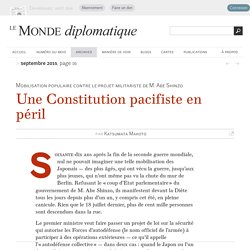
Refusant le « coup d’Etat parlementaire » du gouvernement de M. Abe Shinzo, ils manifestent devant la Diète tous les jours depuis plus d’un an, y compris cet été, en pleine canicule. Rien que le 18 juillet dernier, plus de cent mille personnes sont descendues dans la rue. Le premier ministre veut faire passer un projet de loi sur la sécurité qui autorise les Forces d’autodéfense (le nom officiel de l’armée) à participer à des opérations extérieures — ce qu’il appelle l’« autodéfense collective » — dans deux cas : quand le Japon ou l’un de ses alliés est attaqué et quand il n’existe pas d’autre moyen de protéger le peuple (1).
M. Beaucoup inscrivent cette loi sécuritaire dans le projet de société du premier ministre, ce que M. Akihito : les implications politiques d’une abdication annoncée. Dans son message de commémoration de la fin de la seconde guerre mondiale, le 15 août, l’empereur Akihito a exprimé ses « profonds remords » pour un conflit qui causa des millions de morts à travers l’Asie et le Pacifique.
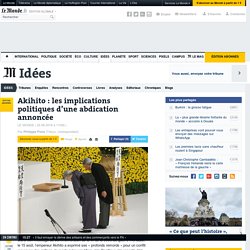
Un repentir déjà exprimé, mais qui prend cette fois un relief particulier. Non seulement parce que c’est l’un des derniers messages que prononce l’empereur, âgé de 81 ans, à cette occasion – puisqu’il a récemment annoncé son intention d’abdiquer –, mais aussi parce qu’il tranche avec l’orientation politique donnée par le premier ministre, Shinzo Abe : au cours de cette cérémonie, celui-ci a réitéré l’engagement à ne pas répéter la tragédie de la guerre, mais il s’est gardé d’exprimer le moindre regret.
M. Abe entend « ne pas prédestiner les générations à venir à devoir s’excuser » – et laisser ainsi s’estomper les responsabilités. « Construire une nation pacifique » Akihito: A Challenge for Japan's Nationalists - The News Lens International Edition. In mid July, news broke on Japan’s national broadcaster NHK that Emperor Akihito wished to abdicate in favor of his son Naruhito.

Owning Our Constitution, Our Future. Japan's Masatoshi Ohno rides a wave during the quarterfinals of the Monster Energy Pro Pipeline surfing competition at Sunset Beach, Hawaii, February 23, 2005 (Lucy Pemoni/REUTERS).
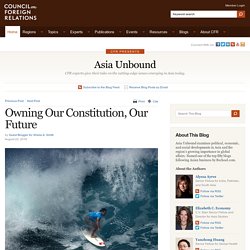
This blog post is part of a series entitled Will the Japanese Change Their Constitution? , in which leading experts discuss the prospects for revising Japan’s postwar constitution. Ayumi Teraoka is research associate for Japan studies at the Council on Foreign Relations. When I ask my American friends what the most memorable world event from their childhood is, they tell me it is 9/11. For me, born and raised in Japan, it is something altogether different—Prime Minister Junichiro Koizumi’s visit to Pyongyang, North Korea in 2002. This excitement that history was being made in our time seemed amplified against the backdrop of the rather-depressing Japan that I lived in as a child. Pourquoi il faut s’intéresser à la démission (possible) de l’empereur du Japon - Le Temps. Will Japan Move to Amend the Constitution?
The ruling Liberal Democratic Party and coalition partner Kōmeitō made solid gains in the July 10 House of Councillors election; together with other conservative-minded members of the upper house, including those belonging to Initiatives from Osaka and Party for Japanese Kokoro, they now have the two-thirds majority (162 seats) required to propose a constitutional amendment.
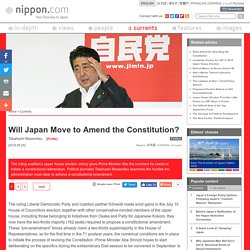
These “pro-amendment” forces already claim a two-thirds supermajority in the House of Representatives, so for the first time in the 71 postwar years, the numerical conditions are in place to initiate the process of revising the Constitution. Prime Minister Abe Shinzō hopes to start deliberating on the specifics during the extraordinary Diet session to be convened in September. Is Japan really about to embark on changing its pacifist Constitution? A Victory for the Coalition The 242 members of the upper house serve six-year terms, with half standing for reelection every three years.